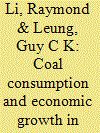| Srl | Item |
| 1 |
ID:
094238


|
|
|
|
|
| Publication |
2010.
|
| Summary/Abstract |
This study examines the relationship between coal consumption and economic growth for 25 OECD countries within a multivariate panel framework over period 1980-2005. The Larsson et al. (2001) panel cointegration test indicates there is a long-run equilibrium relationship between real GDP, coal consumption, real gross fixed capital formation, and the labor force. The respective coefficients for real gross fixed capital formation and the labor force are positive and statistically significant whereas the coefficient for coal consumption is negative and statistically significant. The results of the panel vector error correction model reveal bidirectional causality between coal consumption and economic growth in both the short- and long-run; however, the bidirectional causality in the short-run is negative.
|
|
|
|
|
|
|
|
|
|
|
|
|
|
|
|
| 2 |
ID:
111096


|
|
|
|
|
| Publication |
2012.
|
| Summary/Abstract |
The aim of this paper is to re-examine the relationship between coal consumption and real GDP of China with the use of panel data. This paper applies modern panel data techniques to help shed light on the importance of the heterogeneity among different regions within China. Empirical analyses are conducted for the full panel as well as three subgroups of the panel. The empirical results show that coal consumption and GDP are both I(1) and cointegrated in all regional groupings. Heterogeneity is found in the GDP equation of the full panel. The regional causality tests reveal that the coal consumption-GDP relationship is bidirectional in the Coastal and Central regions whereas causality is unidirectional from GDP to coal consumption in the Western region. Thus, energy conservation measures will not adversely affect the economic growth of the Western region but such measures will likely encumber the economy of the Coastal and Central regions, where most of the coal intensive industries are concentrated.
|
|
|
|
|
|
|
|
|
|
|
|
|
|
|
|
| 3 |
ID:
125664


|
|
|
|
|
| Publication |
2013.
|
| Summary/Abstract |
This paper explores the effects of financial development, economic growth, coal consumption and trade openness on environmental performance using time series data over the period 1965-2008 in case of South Africa. The ARDL bounds testing approach to cointegration has been used to test the long run relationship among the variables while short run dynamics have been investigated by applying error correction method (ECM). The unit root properties of the variables are examined by applying Saikkonen and Lütkepohl (2002. Econometric Theory 18, 313-348) structural break unit root test. Our findings confirmed long run relationship among the variables. Results showed that a rise in economic growth increases energy emissions, while financial development reduces it. Coal consumption has significant contribution to deteriorate environment in South African economy. Trade openness improves environmental quality by reducing the growth of energy pollutants. Our empirical results also verified the existence of environmental Kuznets curve. This paper opens up new insights for South African economy to sustain economic growth by controlling environment from degrdation through efficient use of energy.
|
|
|
|
|
|
|
|
|
|
|
|
|
|
|
|